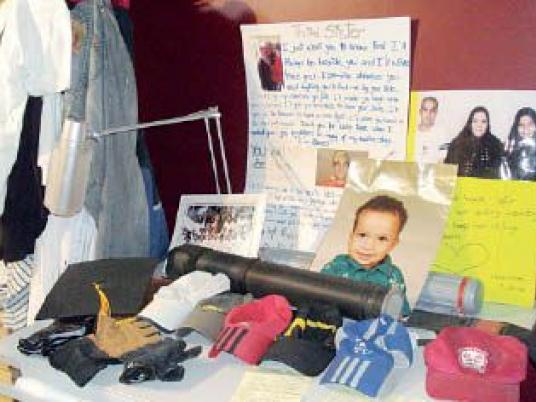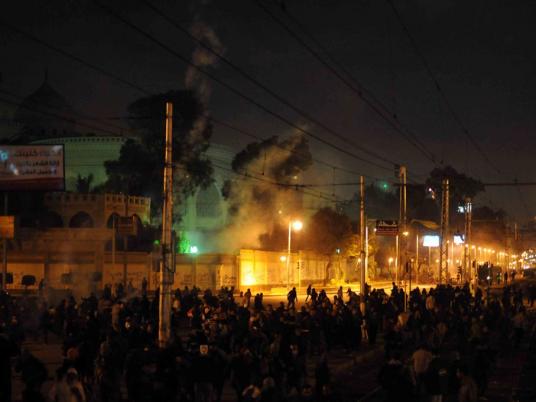
In the second anniversary of an uprising that erupted against poverty, injustice and oppression, demands for the rights of martyrs and those injured continue to resonate at protests. Their families are left to grieve, with no hope of retribution in sight.
Despite the myriad of changes on the political and social fronts, for many of these families, it’s more of the same and little can be done to alleviate their profound sense of loss.
Meanwhile, more acquittals are granted to police officers implicated in the killing of protesters and violations against revolutionaries, with no genuine mechanism of transitional justice on the horizon.
Left behind are memories of lost family members, with the photos adorning the walls of their homes a stark and painful reminder of their loss.
Egypt Independent spoke to two families, one whose son is a revolution martyr and another whose son has been missing since the events of 25 January 2011. Two years on, their sentiment is one of bitter anguish and a lingering pain from neglect and the absence of retribution.
Hosni Mubarak’s ouster, followed by an 18-month transition under military rule, led to Egypt’s first elected civilian president in late June, with the passing of a highly divisive Constitution six months later.
During this time, protests have continued and clashes have erupted between protesters and security forces, leading to more violence, deaths and disappearances.
At the start of every one of these phases — a new ruler, a new Cabinet, a new Parliament — came a spark of hope that someone would be held accountable or some answers would finally be found.
That hope is consistently and swiftly doused — a disappointment felt most by the families of those who have lost their lives in the process.
‘Morsy deceived us’
As Dr. Wafaa, mother of martyr Mohamed Mostafa, killed during the Cabinet clashes in December 2011, awaits justice for her son, she says she was deceived by President Mohamed Morsy.
In a televised appearance in June, amid a fierce runoff between Morsy and presidential hopeful Ahmed Shafiq, Wafaa told Morsy in a phone-in to “Akher Al-Nahar” talk show that she would vote for him because she cannot vote for the killer of her son.
Thousands listened to the aggrieved mother as she spoke to the Muslim Brotherhood’s presidential candidate, who promised that justice would finally be served if elected. Her words and support to Morsy resonated with many ahead of the critical vote.
“Do not worry, Wafaa, the right of your son is my personal responsibility,” said Morsy at the time.
Months later, the broken hearted mother says she was deceived. “We were trapped between the worst two options: Morsy or Shafiq, the Brotherhood or the old regime. But it was Mubarak’s military regime who killed my son — I had to vote for Morsy,” says Wafaa.
“We were deceived by the Brotherhood and we have become a split nation. Morsy is living in a world of his own, a world of his own people and his own tribe,” she says nervously in a phone call from Saudi Arabia, where she is currently performing the Umrah pilgrimage.
Photos of martyr Mohamed Mostafa are prevalent around the six-story building in Cairo’s Nasr City, and when asked for directions, shop owners in the surrounding streets are quick to point out the martyr’s house.
Graffiti of the 19-year-old engineering student, shot during clashes between protesters and military forces in front of the Cabinet building in December 2011, cover the walls by the stairs leading to his apartment. On the door hangs a photo of him.
Inside, pictures of a young and hopeful Mohamed are everywhere you look.
“Mohamed was shot on 21 December. I was always checking on him during the clashes. He was shot with a pellet in his arm and leg [and died a day later],” Mohamed’s sister, Mayada, says, while standing in his room, surrounded by his clothes and small mementos. ”These are photos of him in a swimming competition,” she says, flipping through one of numerous photo albums of her martyred brother. “These were his friends, and this photo was the last one before he died — with a new haircut.”
The family is convinced that the brutal killing of 74 Ahlawy ultras — groups of hardcore football fans who were instrumental during revolutionary protests — in early 2012 at the Port Said Stadium is related to Mohamed’s death.
“Mohamed was an ultras member. After his death, the ultras community was moved by the tragedy and, for the first time, chanted against military rule at one of the matches before the massacre in Port Said happened,” Mayada says.
“I’m sure this massacre was a warning to get the ultras to stop intervening in politics,” she adds.
At the football match in January 2012, Ultras Ahlawy entered the stadium and formed a big picture of Mohamed’s face, a poignant moment for the millions watching. “The game was aired live on national TV, and it might be the first time many Egyptians heard chants against military rule,” she says.
Her mother, Wafaa, says the only choice for Egyptians is to continue the revolution, and adds that making people more politically and socially aware is a prerequisite for any measure of success.
“Those who vote for the Brotherhood and are deceived by their propaganda need to be aware of their true face and know that they are no different from Mubarak and the military,” she says.
“I have given the most precious thing I have: my son. What else can I give?” she asks.
For family members, it is the mundane and simple details that tear at their hearts.
“Here are new shoes he bought so he could wear them in the cold weather,” Mayada says, recounting his plans to visit the US. “These are clothes he’d just picked up from the cleaners.”
“When I look at pictures, I touch the photo and I feel as if I’m touching his skin. I can feel him around me,” Mayada says, clutching the photo album close to her chest, her eyes watery with unshed tears. “We seem strong in front of people and the media, but God knows how we spend our nights.”
Tales of the lost
On 28 January 2011, Mohamed Seddiq, 27 at the time, left home for Friday prayers at the nearby mosque, just like millions of Egyptians do every week. But this was no normal Friday.
Seddiq knew something extraordinary was going to happen on that day. He had already decided to go the protests, subseuently dubbed the “Friday of Anger,” and planned on actively taking part in the uprising.
But when Mubarak stepped down on 11 February, and as millions celebrated in the streets, the mood was very different for Seddiq’s family.
“On 11 February, the same day of Mubarak’s ouster, he called to tell me he’d been arrested. I’ve heard nothing from him ever since,” says Sabah, a mother who has not known the whereabouts or fate of her son for the last two years.
“He was going to Friday prayers like everyone else. I knew he was going to take part in the protests, but I never imagined it would be this serious,” Sabah tells Egypt Independent.
His mobile phone was switched off throughout the 18 days of the uprising and she only heard from him on that landmark day in Egypt’s history.
Months later, in one of her tireless attempts to call his phone in the hope that he would answer, someone did pick up. But it was not her son’s voice. In an angry tone, the voice on the phone said he was a soldier at al-Gabal al-Ahmar Prison. “We will teach you not to revolt ever again,” Sabah says the man told her threateningly.
She met Morsy two days before the runoff and was promised an investigation into the cases of all missing revolutionaries. “Nothing has happened since. I only managed to find out from police that my son received a three-year prison sentence — but for what and where? I don’t know,” she says.
A campaign called Hanla2ihom, Arabic for “We will find them,” has been launched to look into the cases of those missing, whose total number is unknown. Campaign members say those who went missing may have been tried in front of military courts with their cases unregistered.
Rights activists say most civilians who faced military trials were randomly arrested by army and police forces and received long prison sentences while their families were never notified.
A list of 1,200 missing civilians was sent to former Prime Minister Essam Sharaf for investigation but this inquisition never materialized. What’s more, the list of missing persons has never been updated, even though more disappearances were reported during the Mohamed Mahmoud and Cabinet clashes in November and December 2011.
Families complain about the lack of transparency and cooperation from security forces. While they toured prisons around the country, they still have no access to their children. Rights activists say forced disappearances are a violation more severe than murder.
As time drags on, families of the missing wait in anticipation for their return, amid a mix of hope, fear and pain.



